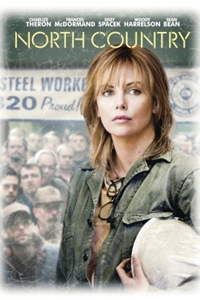North Country (R) ★★★
 North Country isn't for those short on patience or time. But for the rest of us, the superb acting and relevant theme makes it more than worth it.
North Country isn't for those short on patience or time. But for the rest of us, the superb acting and relevant theme makes it more than worth it.
Story
Set in 1984, Josey Aimes (Charlize Theron) returns to her ice-cold hometown in Northern Minnesota after fleeing from an abusive husband. In order to care for her two young kids, she needs a job--and for most of the townsfolk, including her distant dad (Richard Jenkins), that means working in the local iron mines. Problem is, not too many women work there, and those who do are subjected to continual harassment by their male coworkers. Josey lands a job anyway and starts to get her fair share of sexual innuendos. One day her former high-school sweetheart, also a mine employee, takes it way too far with her. Although met with strong resistance, of course, a lawsuit ensues that results in a groundbreaking decision for women’s rights in the workplace.
Acting
Ah, what an Oscar can do for a career. It wasn't that long ago Theron wouldn’t even have been considered for such a dramatic role. But with deserved recognition, she gets to strut her stuff in North Country. She's no Monster, but she's no supermodel either--and while it's impossible to erase her beauty, its glare has been reduced. A second-consecutive Oscar win? Maybe not but a nomination wouldn't be out of the place. Co-star Frances McDormand might also be in line for a nod of her own. She plays Glory, a woman who gets Josey the job and encourages her to fight the good fight, something that seems visceral for McDormand. Woody Harrelson is also solid as Josey's attorney, though his Midwest-stoner drawl gets in the way of the northern accent he's supposed to be selling.
Direction
New Zealand director Niki Caro mightily impressed us with Whale Rider, a poignant mixture of grief and vigor and with North Country, she continues to impress. As more an observer than anything else, Caro lets the true story tell itself--of what happened in this small town, with its frigid denizens and sexist behavior. And the film is definitely a period piece, á la Norma Rae, in that it's from a specific period, albeit a recent one, and pertains to a specific region. But it's kind of slow going. There’s a lot of weeping and dramatic speeches. Still, Caro makes up for it by including several Bob Dylan songs, who rarely grants the use of his songs in films. Perhaps he felt a certain a kinship to this film since it takes place in the desolate, cold Northern Minnesota where he comes from--and so resents.
To get the full Quicklook Films experience, uncheck "Enable on this Site" from Adblock Plus
box office top 10

Civil War Released: April 12, 2024 Cast: Kirsten Dunst, Wagner Moura 25.7M

Godzilla x Kong: The New Empire Released: March 29, 2024 Cast: Rebecca Hall, Brian Tyree Henry 15.5M

Ghostbusters: Frozen Empire Released: March 22, 2024 Cast: Paul Rudd, Carrie Coon 5.8M

Kung Fu Panda 4 Released: March 8, 2024 Cast: Jack Black, Viola Davis 5.5M

Dune: Part Two Released: March 1, 2024 Cast: Timothée Chalamet, Rebecca Ferguson 4.3M

Monkey Man Released: April 5, 2024 Cast: Dev Patel, Sikandar Kher 4.1M

The First Omen Released: April 5, 2024 Cast: Nell Tiger Free, Bill Nighy 3.8M

The Long Game Released: April 12, 2024 Cast: Dennis Quaid, Gillian Vigman 1.4M

Shrek 2 Released: May 19, 2004 Cast: Mike Myers, Eddie Murphy 1.4M

Sting Released: April 12, 2024 Cast: Alyla Browne, Ryan Corr 1.2M






